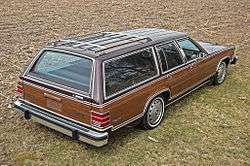Mercury Colony Park
| Mercury Colony Park | |
|---|---|
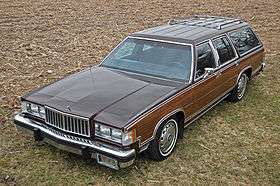 1984 Mercury Grand Marquis Colony Park | |
| Overview | |
| Manufacturer | Mercury (Ford) |
| Production | 1957–1991 |
| Assembly |
St. Louis, Missouri Pico Rivera, California Atlanta, Georgia Mahwah, New Jersey |
| Body and chassis | |
| Class | Full-size |
| Body style | 4-door station wagon |
| Layout | FR layout |
| Chronology | |
| Predecessor | Mercury Monterey station wagon |
The Mercury Colony Park is a full-size station wagon that was offered by Mercury between 1957 and 1991 as their top-of-the-line model. Following the demise of Edsel, the Colony Park became the Mercury equivalent of the Ford Country Squire and the station wagon version of the Marquis in 1969.
It was distinguished by DI-NOC woodgrain paneling on the body sides and tailgate, a feature also associated with competitive station wagons such as the Chrysler Town & Country, Buick Estate, and the Oldsmobile Custom Cruiser.
First generation (1957–1958)
| First generation | |
|---|---|
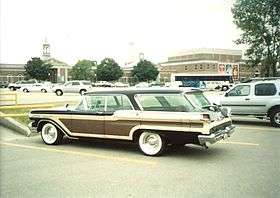 | |
| Overview | |
| Model years | 1957–1958 |
| Body and chassis | |
| Related |
Mercury Turnpike Cruiser Mercury Park Lane Mercury Montclair Mercury Monterey Mercury Voyager Mercury Commuter Edsel Citation Edsel Corsair |
| Powertrain | |
| Engine |
368 cu in (6.0 L) Lincoln Y-Block V8 383 cu in (6.3 L) Marauder V8 430 cu in (7.0 L) Super Marauder V8 |
| Transmission |
3-speed manual 3-speed Merc-O-Matic automatic |
| Dimensions | |
| Wheelbase | 122.0 in (3,099 mm)[1] |
| Length |
1957: 211.1 in (5,362 mm) 1958: 214.2 in (5,441 mm) |
| Width | 79.1 in (2,009 mm)[1] |
| Height | 58.3 in (1,481 mm) |
| Curb weight | 4,400–4,800 lb (2,000–2,200 kg) |
For 1957, the Mercury model line underwent major revisions. After sharing bodies with Lincoln since 1949, Mercury was changed to share bodies and chassis with the premium models of the upcoming Edsel division released for 1958. Following the lead of Ford, Mercury discontinued the Monterey station wagon in favor of a separate line of station wagons (sharing chassis with sedans).
As with Ford, Mercury offered three station wagons, the Commuter, Voyager, and the Colony Park. While the Commuter and Voyager were sold in two-door and four-door configurations, the Colony Park was sold only as a four-door. In contrast to Ford and Edsel station wagons, all Mercury station wagons were sold as pillarless hardtops.
Though Edsel would share its premium Corsair and Citation lines with Mercury, its Roundup, Villager, and woodgrained Bermuda station wagons all shared a chassis and roofline with Ford station wagons.
As the flagship of the Mercury station wagon line, the Mercury Colony Park was trimmed similar to the Mercury Montclair, above the Monterey. Sharing its powertrain with the Montclair and the Turnpike Cruiser, a 368 cu in (6.0 L) Lincoln Y-Block V8 was the standard engine. For 1958, the Y-block was replaced by two MEL V8s, a 383 Marauder V8 and a 430 Super Marauder V8; a retuned version of a Lincoln engine, the Super Marauder V8 was the first American mass-production engine rated at 400 hp.
Inside, an electric clock was also standard.[1] A padded dash was optional.[2]
Second generation (1959–1960)
| Second generation | |
|---|---|
 | |
| Overview | |
| Model years | 1959–1960 |
| Body and chassis | |
| Related |
Mercury Park Lane Mercury Montclair Mercury Monterey Mercury Commuter |
| Powertrain | |
| Engine |
383 cu in (6.3 L) Marauder V8 430 cu in (7.0 L) Super Marauder V8 |
| Transmission | 3-speed Merc-O-Matic automatic |
| Dimensions | |
| Wheelbase | 126.0 in (3,200 mm) |
| Length |
1959: 218.2 in (5,542 mm) 1960: 219.2 in (5,568 mm) |
| Width |
1959: 80.7 in (2,050 mm) 1960: 81.5 in (2,070 mm) |
| Height | 57.8 in (1,468 mm) |
| Curb weight | 4,800–4,900 lb (2,200–2,200 kg) |
For the 1959 model year, following the discontinuation of the mid-trim Voyager, the Mercury station wagon line was pared down to the Commuter and the Colony Park. The station wagons adopted a new chassis introduced by the Mercury Park Lane, stretching the wheelbase to 126 inches; the wheelbase of a Colony Park was now 8 inches longer than that of any Ford station wagon. With a curb weight of nearly 5000 pounds, Mercury specified the 315-hp 430 cubic-inch MEL engine shared with Lincoln and the Ford Thunderbird.
Mercury station wagons of this vintage had the longest wheelbase, the widest bodies and the most cargo space of any station wagon ever built by this make.
| 1960 to 1970 comparison | 1960 Colony Park | 1970 Colony Park |
|---|---|---|
| Wheelbase | 126.0 in (3,200 mm) | 121.0 in (3,073 mm) |
| Track Width (front/rear) | 60.0 in (1,524 mm) | 64.1 in (1,628 mm)/64.3 in (1,633 mm) |
| Overall Length | 219.2 in (5,568 mm) | 220.5 in (5,601 mm) |
| Width | 81.5 in (2,070 mm) | 79.8 in (2,027 mm) |
| Top Front Seat to Top Tailgate (closed) | 83.4 in (2,118 mm) | 84.0 in (2,134 mm) |
| Top Second Seat to Top Tailgate (closed) | 49.5 in (1,257 mm) | 51.0 in (1,295 mm) |
| Width at Second Seat | 60.8 in (1,544 mm) | 62.0 in (1,575 mm) |
| Floor to Roof (over rear axle) | 34.4 in (874 mm) | 32.0 in (813 mm) |
| Total Cargo Capacity (behind front seat) | 101.7 cu ft (2,880 L) | 96.2 cu ft (2,724 L) |
| Total Cargo Capacity (behind rear seat) | 60.4 cu ft (1,710 L) | 58.4 cu ft (1,654 L) |
1959 Mercury Colony Park frame off restoration and info.
Third generation (1961–1964)
| Third generation | |
|---|---|
 | |
| Overview | |
| Also called | Mercury Monterey Colony Park |
| Model years | 1961–1964 |
| Body and chassis | |
| Related |
Mercury Park Lane Mercury Montclair Mercury Monterey Mercury Meteor Mercury Commuter Ford Galaxie Ford Fairlane Ford 300 Ford Custom Ford Country Squire |
| Dimensions | |
| Wheelbase | 120.0 in (3,048 mm) |
To make a better business case for the Mercury division, the chassis for full-size Mercury models adopted that of the 1960 Ford. While sharing much of the external bodywork of the Ford, Mercury was given a slightly longer wheelbase (in a tradition that would be kept until 1978). In the stand-alone station wagon line, the Colony Park was trimmed similar to the Monterey, which became the sole full-size Mercury after 1961.
Fourth generation (1965–1968)
| Fourth generation | |
|---|---|
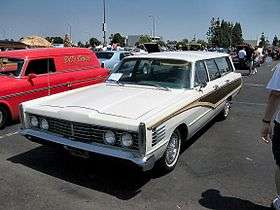 1965 Mercury Colony Park | |
| Overview | |
| Production | 1965–1968 |
| Body and chassis | |
| Related |
Mercury Commuter Ford LTD/Ford Galaxie |
| Powertrain | |
| Engine |
390 cu in (6.4 L) FE V8 410 cu in (6.7 L) Marauder V8 |
| Dimensions | |
| Wheelbase | 119.0 in (3,023 mm) |
In 1965, Colony Park was promoted to "the Lincoln Continental of station wagons", when it was given the Lincoln Continental's suspension package (along with its cushy, floaterboat ride). It continued to enjoy this distinction through its final year.
The 1966 Colony Park was fitted with Ford's two-way "Magic Doorgate", which was designed to fold down like a conventional tailgate and also swing sideways like a door. Ford's dual-facing rear seats became available on the 1967 Colony Park. Mercury also introduced a feature where windflow was directed across the rear window through channels integrated and covered with the "D" pillar. This also allowed fresh air to enter into the rear of the vehicle if the rear window was retracted into the tailgate.
On third-generation Colony Parks, the standard engine was a 390 cu in (6.4 L) FE V8 with 270 horsepower (200 kW). From 1966 to 1967, the 410 cu in (6.7 L) FE "Marauder" V8 with 330 horsepower (250 kW) was an option.[3] For a brief period, the Mercury Park Lane coupe and convertible were available with the simulated wood paneling, called "yacht deck paneling", but was rarely ordered, reviving an appearance from the 1941-48 Ford Sportsman convertible.
 1966 Colony Park |
 1966 2-way tailgate with side-swing door handle |
Fifth generation (1969–1978)
| Fifth generation | |
|---|---|
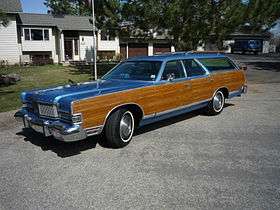 1974 Mercury Marquis Colony Park | |
| Overview | |
| Also called | Mercury Marquis Colony Park |
| Production | 1969–1978 |
| Assembly |
Hazelwood, Missouri (St. Louis Assembly Plant) Pico Rivera, California (Los Angeles Assembly) Hapeville, Georgia (Atlanta Assembly) |
| Body and chassis | |
| Layout | FR layout |
| Related |
Ford LTD Ford Country Squire Ford Galaxie Mercury Grand Marquis Mercury Marquis |
| Powertrain | |
| Engine |
351 cu in (5.8 L) Windsor V8 400 cu in (6.6 L) Cleveland V8 460 cu in (7.5 L) 385 V8 |
| Dimensions | |
| Wheelbase | 121.0 in (3,073 mm) |
| Length | 220.5 in (5,601 mm) |
| Width | 81.1 in (2,060 mm) |
| Curb weight | 4,740 lb (2,150 kg) |

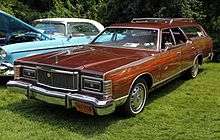
For the 1969 model year, the Ford and Mercury station wagon model lines were consolidated with their sedan counterparts rather than remaining separate model lines.[4] For the Mercury Colony Park, the change added it to the newly expanded Mercury Marquis model line. In contrast to the Marquis sedan, the Colony Park was based on the 121-inch wheelbase used by the Ford Country Squire and the Ford LTD.[4]
This generation introduced covered headlights, which were deployed using a vacuum canister system that kept the doors down when a vacuum condition existed in the lines, provided by the engine when it was running. If a loss of vacuum occurred, the doors would retract up so that the headlights were visible if the system should fail.[4] The Magic Doorgate was reworked to that it could swing outward without having to roll the window down.[4]
Although narrower than the 1959–1960 generation, this generation of the Colony Park would be the longest and heaviest station wagon ever sold by Mercury. Due to its nearly 5000 lb curb weight, the standard engine was a 400 cubic-inch V8 with a 429 cubic-inch V8 as an option; in 1972, the 429 was replaced by a 460 cubic-inch V8 sourced from Lincoln. For the 1978 model year, a 351 Windsor V8 became standard (outside of California and high-altitude areas), with the 400 and 460 as options.[4] However, most surviving examples are likely equipped with one of the two larger V8 engines, as they were far more popular, with the 351 proving to have little fuel-economy gains.
Approximately 7,850,000 full-size Fords and Mercurys were sold over 1969-78.[5][6] This makes it the second best selling Ford automobile platform after the Ford Model T.[4]
Sixth generation (1979–1991)
| Sixth generation | |
|---|---|
 | |
| Overview | |
| Also called | Mercury Grand Marquis Colony Park |
| Production |
1979–1991 124,027 produced |
| Assembly |
Hazelwood, Missouri (St. Louis Assembly) Talbotville, Ontario, (St. Thomas Assembly) |
| Body and chassis | |
| Platform | Ford Panther platform |
| Related |
Ford LTD Ford Country Squire Ford LTD Crown Victoria Mercury Grand Marquis Mercury Marquis |
| Powertrain | |
| Engine |
302 cu in (4.9 L) 5.0 Windsor V8 351 cu in (5.8 L) Windsor V8 |
| Transmission |
3-speed C4 automatic 3-speed FMX automatic 4-speed AOD automatic |
| Dimensions | |
| Wheelbase | 114.3 in (2,903 mm) |
| Length | 219 in (5,563 mm) |
| Width | 79.3 in (2,014 mm)[7] |
| Height | 56.5 in (1,435 mm)[7] |
| Curb weight | 4,032 lb (1,829 kg) [7] |
As the full-size Mercury product line was redesigned for the 1979 model year as part of an extensive physical downsizing, the Colony Park became part of the Grand Marquis model line, clearing room for a non-woodgrain Marquis station wagon. To remain competitive with its Buick and Oldsmobile counterparts (Chrysler dropped full-size wagons altogether after 1978), the 1979 Colony Park shed over 11 inches in length, 6.6 inches in wheelbase, 0.4 inches in width, and had lost slightly over 1,000 lbs in weight (in comparison to its 1978 predecessor).[8] As before, woodgrain siding remained standard equipment, along with 8-passenger seating.
The Colony Park was powered by two engines: a 4.9 L Windsor V8 (identified as a 5.0 L by Ford) with a carbureted 5.8 L Windsor V8. In the interest of upcoming fuel-economy standards, the 400 and 460 V8s were discontinued. To further enhance fuel economy, in 1981, both V8 engines were paired with the 4-speed AOD overdrive transmission, the first of its type in an American full-size car; in addition, the 4.9L V8 was converted to fuel injection. In 1982, as most customers deemed the 4.9L V8 sufficiently powerful, it became the sole engine offering in the Colony Park (and all Ford, Lincoln, and Mercury full-size cars).
This generation of Colony Park would see few substantial changes during its thirteen-year lifespan. For 1983, it became the sole full-size Mercury wagon as the previous year's 'base' Marquis wagon was no longer offered as a full-size model. In 1986, the 5.8L engine made its return as an (rarely specified) option. Starting in 1987, the Colony Park wagon was offered in GS and LS trim.
After nine years with only detail changes to the body and trim, the Colony Park received a major update alongside the Grand Marquis for 1988. From the windshield forward, a more aerodynamic front end better integrated the fenders, grille, headlights, and bumpers. Inside, the front seats were modernized. For 1990, as part of an addition of a drivers' side airbag, the entire instrument panel and dashboard received a redesign; all outboard seats received 3-point seatbelts.
|
| Year | 1979 | 1980 | 1981 | 1982 | 1983 | 1984 | 1985 | 1986 | 1987 | 1988 | 1989 | 1990 | 1991 | Total production |
|---|---|---|---|---|---|---|---|---|---|---|---|---|---|---|
| Units | 13,758 | 5,781 | 6,293 | 8,004 | 12,394 | 17,421 | 14,119 | 9,891 | 10,691 | 9,456 | 8,665 | 4,450 | 3,104 | 124,027 |
Discontinuation
When the Grand Marquis was redesigned with aero-styling for 1992, the Colony Park station wagon was dropped from Mercury's lineup. By that time, full-size station wagons were no longer popular due to the increasing popularity of minivans and SUVs. The last full-size station wagons, the Chevrolet Caprice, Oldsmobile Custom Cruiser, and Buick Roadmaster Estate ended production in 1996, with the Custom Cruiser ending production earlier in 1992. In 2005, DaimlerChrysler briefly reintroduced the Dodge Magnum name on a full-size wagon, based on the LX platform Chrysler 300, but it was dropped in 2008.
References
- 1 2 3 Flory, Jr., J. "Kelly" (2008). American Cars, 1946–1959 Every Model Every Year. McFarland & Company, Inc., Publishers. ISBN 978-0-7864-3229-5.
- ↑ http://www.oldcarbrochures.com/static/NA/Mercury/1957%20Mercury/1957_Mercury_Brochure/1957%20Mercury%20Brochure-31.html
- ↑ 1968 Kelley Blue Book
- 1 2 3 4 5 6 Odin, L.C. A concise guide to the Ford and Mercury full-size automobile production 1969-1978. Belvedere Publishing, 2016. ASIN: B01HE91Y4K.
- ↑ Kowalke, Ron (1997). Standard Catalog of American Cars 1946–1975. Krause publications. ISBN 0-87341-521-3.
- ↑ Flammang, James Standard Catalog of American Cars 1976–1999 3rd Edition (Iola, WI: Krause Publications, Inc 1999)
- 1 2 3 http://www.edmunds.com/mercury/grand-marquis/1991/features-specs.html?style=2497
- ↑ http://www.automobile-catalog.com/auta_cmp2.php
- ↑ "Box Panther Production Numbers". Retrieved 21 February 2014.
- "Standard Catalog of Ford" 1903–1998 by Krause Publications ISBN 0-87341-636-8
External links
| Wikimedia Commons has media related to Mercury Colony Park. |
- Grandmarq.net Forum dedicated to the Ford, Lincoln, and Mercury Panther Chassis
| Mercury passenger vehicle timeline, 1940–1979 — next » | ||||||||||||||||||||||||||||||||||||||||||||||||||
|---|---|---|---|---|---|---|---|---|---|---|---|---|---|---|---|---|---|---|---|---|---|---|---|---|---|---|---|---|---|---|---|---|---|---|---|---|---|---|---|---|---|---|---|---|---|---|---|---|---|---|
| Type | 1940s | 1950s | 1960s | 1970s | ||||||||||||||||||||||||||||||||||||||||||||||
| 0 | 1 | 2 | 3 | 4 | 5 | 6 | 7 | 8 | 9 | 0 | 1 | 2 | 3 | 4 | 5 | 6 | 7 | 8 | 9 | 0 | 1 | 2 | 3 | 4 | 5 | 6 | 7 | 8 | 9 | 0 | 1 | 2 | 3 | 4 | 5 | 6 | 7 | 8 | 9 | |||||||||||
| Subcompact | WWII | Bobcat | ||||||||||||||||||||||||||||||||||||||||||||||||
| Compact | Comet | Comet | Comet | Zephyr | ||||||||||||||||||||||||||||||||||||||||||||||
| Monarch | ||||||||||||||||||||||||||||||||||||||||||||||||||
| Mid-size | Montego | Montego | Cougar | |||||||||||||||||||||||||||||||||||||||||||||||
| Meteor | Comet | Comet | ||||||||||||||||||||||||||||||||||||||||||||||||
| Full-size | Custom | Medalist | Meteor | |||||||||||||||||||||||||||||||||||||||||||||||
| Eight | Eight | Eight | Eight | Monterey | Monterey | Monterey | Monterey | Monterey | Monterey | Monterey | ||||||||||||||||||||||||||||||||||||||||
| Montclair | Montclair | Montclair | Montclair | Montclair | Marquis | Marquis | ||||||||||||||||||||||||||||||||||||||||||||
| Park Lane | Park Lane | Park Lane | Park Lane | |||||||||||||||||||||||||||||||||||||||||||||||
| Turnpike Cruiser | S-55 | S-55 | Marauder | |||||||||||||||||||||||||||||||||||||||||||||||
| Station Wagon | Commuter | Commuter | Commuter | Commuter | Commuter | |||||||||||||||||||||||||||||||||||||||||||||
| Voyager | ||||||||||||||||||||||||||||||||||||||||||||||||||
| Colony Park | Colony Park | Colony Park | Colony Park | Colony Park | Colony Park | |||||||||||||||||||||||||||||||||||||||||||||
| Sports car | Capri | Capri II | Capri | |||||||||||||||||||||||||||||||||||||||||||||||
| Cougar | Cougar | |||||||||||||||||||||||||||||||||||||||||||||||||
| Personal luxury | Cougar | Cougar | ||||||||||||||||||||||||||||||||||||||||||||||||
| Pickup Truck | M-Series | M-Series | M-Series | M-Series | ||||||||||||||||||||||||||||||||||||||||||||||
| « previous — Mercury passenger vehicle timeline, 1980–2011 | |||||||||||||||||||||||||||||||||
|---|---|---|---|---|---|---|---|---|---|---|---|---|---|---|---|---|---|---|---|---|---|---|---|---|---|---|---|---|---|---|---|---|---|
| Type | 1980s | 1990s | 2000s | 2010s | |||||||||||||||||||||||||||||
| 0 | 1 | 2 | 3 | 4 | 5 | 6 | 7 | 8 | 9 | 0 | 1 | 2 | 3 | 4 | 5 | 6 | 7 | 8 | 9 | 0 | 1 | 2 | 3 | 4 | 5 | 6 | 7 | 8 | 9 | 0 | 1 | ||
| Coupe | |||||||||||||||||||||||||||||||||
| Sport compact | Capri | Capri | Cougar | ||||||||||||||||||||||||||||||
| LN7 | |||||||||||||||||||||||||||||||||
| Personal luxury | Cougar | Cougar | Cougar | ||||||||||||||||||||||||||||||
| Sedan | Subcompact | Bobcat | Lynx | Tracer | |||||||||||||||||||||||||||||
| Compact | Tracer | Tracer | |||||||||||||||||||||||||||||||
| Zephyr | Topaz | Topaz | Mystique | ||||||||||||||||||||||||||||||
| Monarch | |||||||||||||||||||||||||||||||||
| Mid-size | Cougar | Marquis | Sable | Sable | Sable | Sable | Milan | ||||||||||||||||||||||||||
| Full-size | Marquis | Marauder | Montego | Sable | |||||||||||||||||||||||||||||
| Grand Marquis | Grand Marquis | Grand Marquis | Grand Marquis | ||||||||||||||||||||||||||||||
| Station Wagon | Subcompact | Bobcat | Lynx | Tracer | |||||||||||||||||||||||||||||
| Compact | Zephyr | Tracer | Tracer | ||||||||||||||||||||||||||||||
| Mid-size | Cougar | Marquis | Sable | Sable | Sable | Sable | |||||||||||||||||||||||||||
| Full-size | Colony Park | ||||||||||||||||||||||||||||||||
| Light truck | |||||||||||||||||||||||||||||||||
| SUV | Mariner | Mariner | |||||||||||||||||||||||||||||||
| Mountaineer | Mountaineer | Mountaineer | |||||||||||||||||||||||||||||||
| Minivan | Villager | Villager | Monterey | ||||||||||||||||||||||||||||||

